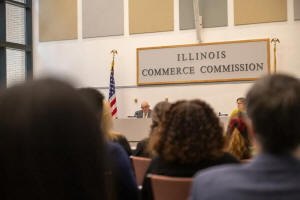State cracks down on Chicago gas utility as other utilities ask for rate
increase
 Send a link to a friend
Send a link to a friend
 [February 21, 2025]
By Lily Carey, Andrew Adams [February 21, 2025]
By Lily Carey, Andrew Adams
CHICAGO — State regulators on Thursday ordered Chicago’s natural gas
utility, Peoples Gas, to abandon its approach to a long-beleaguered
pipeline replacement program. Consumer advocates praised the decision,
but the company said the decision could cost customers.
Meanwhile, natural gas utilities in the suburbs and downstate are asking
regulators to increase prices by $7 to $9 per month for the average
residential customer.
The Peoples Gas decision at the Illinois Commerce Commission followed a
yearlong ICC investigation into the utility. Its System Modernization
Program, launched more than a decade ago, was initially intended to
replace at-risk gas mains across the city, many of which have less than
10 years remaining in their lifespans.
But the program went far over its initial budget estimate of $1.4
billion, leading to rate hikes that left nearly one in five Peoples Gas
customers behind on their bills. A report by consumer advocates at the
Citizens Utility Board late last year found that continuing the program
would have cost $12.8 billion, although the company argued the actual
costs would have been lower.
The plan approved by the ICC on Thursday will allow the pipe replacement
program to restart — but will institute safety monitoring and sweeping
changes to ensure Peoples Gas focuses specifically on the riskiest
pipes.
“This investigation showed that Peoples Gas was not prioritizing
removing (at-risk pipes), but rather pursued it as one of several
components of its program. As a result, the retirement rates (for these
pipes) went down,” ICC Commissioner Stacey Paradis said at the meeting.

As part of the ICC investigation, Peoples Gas proposed three options in
November 2024 for continuing the pipe replacement program. But according
to Commission Chair Doug Scott, the utility didn’t comply with many of
the ICC’s orders, leaving the agency “unable to properly evaluate the
program options proposed by the company.”
Instead, the ICC ordered Peoples Gas to launch a new program that
focuses specifically on replacing cast iron and ductile iron pipes by
2035. There are 1,112 miles of these pipes beneath Chicago streets, and
according to analyses by engineers throughout the investigation, they
are by far the highest-risk part of Peoples Gas’ delivery system.
The commission also ordered a Safety Monitoring Report to follow the
implementation of Peoples Gas’ new program. The report is to be
completed in March 2027.
According to Peoples Gas spokesman David Schwartz, the commission’s
order “may necessitate additional cost and more construction sites
disrupting streets across city neighborhoods.”
For consumer advocates, the ICC’s decision was seen as a promising step
toward holding utilities accountable.
“There’s going to be a real focus on ensuring that the investments are
cost effective and effectively addressing the safety risks in the
system. And I think that’s a big improvement,” said Abe Scarr, director
of the Illinois Policy Interest Research Group and longtime critic of
Peoples Gas.
Rate increases downstate
The ICC is also considering requests from the two other major gas
utilities to raise monthly bills for customers in the Chicago suburbs
and downstate.
Nicor Gas, the largest gas utility in the state, filed a request for a
$309 million rate increase that would affect 2.3 million customers in
northern Illinois and the Chicago suburbs. The company’s proposal would
raise typical residential bills by about $7.50 per month – about a 9%
increase, according to a company spokesperson.
Ameren Illinois, which serves about 812,000 customers in downstate
Illinois, also filed for a $134.4 million rate increase in January. An
Ameren spokesperson said typical residential bills would go up by $9.09
per month – an 11.9% increase – under the company’s plan.
Representatives from both companies pointed to the need to replace aging
infrastructure for gas transmission and upgrades to gas storage
facilities as key projects that will be funded by the rate increases.
Matt Tomc, the head of regulatory affairs for Ameren, told Capitol News
Illinois the storage fields – which keep natural gas underground for use
on days with high demand – have become more important over the past
decade.
[to top of second column]
|

Dozens watch as members of the Illinois Commerce Commission discuss
their ruling following more than a year of investigation into
Chicago utility Peoples Gas. (Capitol News Illinois photo by Andrew
Adams)

“As we’ve experienced some of these prolonged cold snaps, these
facilities have become critical,” he said.
Tomc also noted that many of the maintenance and infrastructure upgrades
Ameren has planned are to comply with federal safety regulations put in
place following a deadly gas pipeline explosion in San Bruno, California
in 2010.
But some critics of the companies say the requests would overly burden
customers and put too much money in the pockets of shareholders.
Consumer advocates at the Citizens Utility Board – a nonprofit
organization that provides testimony on behalf of customers in rate
cases – said the Nicor request is the largest in state history. If
approved, Nicor would have been granted over $1 billion in rate
increases since 2018.
“When you consider that gas distribution utilities make money by
spending money on infrastructure, it makes sense that they’re going to
come in for rate cases to get more money to spend on infrastructure,”
CUB Executive Director Sarah Moskowitz said. “Because that’s what they
earn a rate of return on. It’s the role of advocates and regulators to
act as a counterbalance to that.”
CUB also opposes the companies’ proposed increases to their return on
equity – a measure of how much money is paid out to company
shareholders.
Future of gas
Beyond the relatively narrow decision in the Peoples Gas investigation
and rate cases the ICC is currently considering what the future of the
natural gas industry will look like in Illinois.
After rate cases from all three major gas utilities presented similar
problems in 2023, the ICC initiated a “Future of Gas” proceeding to
better plan how to align the natural gas industry with the state’s goal
to have a “clean” energy sector by 2050.
“It’s really a decarbonization process to really think through what are
all of the different pathways we have to decarbonize the natural gas
sector,” ICC Executive Director Jonathan Feipel said Tuesday. “There’s a
whole slew of tools – everything from energy efficiency to different
technologies to electrification.”
The trend toward electrification for things like vehicles and home
heating has become a goal for many environmentalists, but a thorn in the
side for some natural gas advocates.
Jen Walling, the head of the Illinois Environmental Council, said last
week she and other environmental advocates are working on a bill that
would encourage faster electrification of buildings and a reduction in
natural gas use.

But she also noted she doesn’t expect major legislation on the subject
to move soon, instead pointing to the ICC’s Future of Gas proceeding as
a main driver of energy policy.
Ameren’s Tomc said the company recognizes there is a “transition with
respect to how we use energy.”
In their rate case, Ameren even outlined a plan to pilot a “renewable
natural gas” – that generates fewer greenhouse gas emissions – and a
“zonal electrification” program in which communities can elect to forgo
replacing aging gas pipes and instead go all-electric.
But Tomc said he is concerned that without appropriate planning
customers will end up paying more for gas, electricity or both. He said
more intervention from regulators could be necessary to avoid that.
“Maybe we shouldn’t leave it just to the markets,” Tomc said. “Maybe we
need to do more resource planning – and Ameren supports that.”
Lily Carey is a graduate student in journalism with
Northwestern University’s Medill School of Journalism, Media,
Integrated Marketing Communications, and a Fellow in its Medill
Illinois News Bureau working in partnership with Capitol News
Illinois.
Capitol News Illinois is
a nonprofit, nonpartisan news service that distributes state
government coverage to hundreds of news outlets statewide. It is
funded primarily by the Illinois Press Foundation and the Robert R.
McCormick Foundation. |